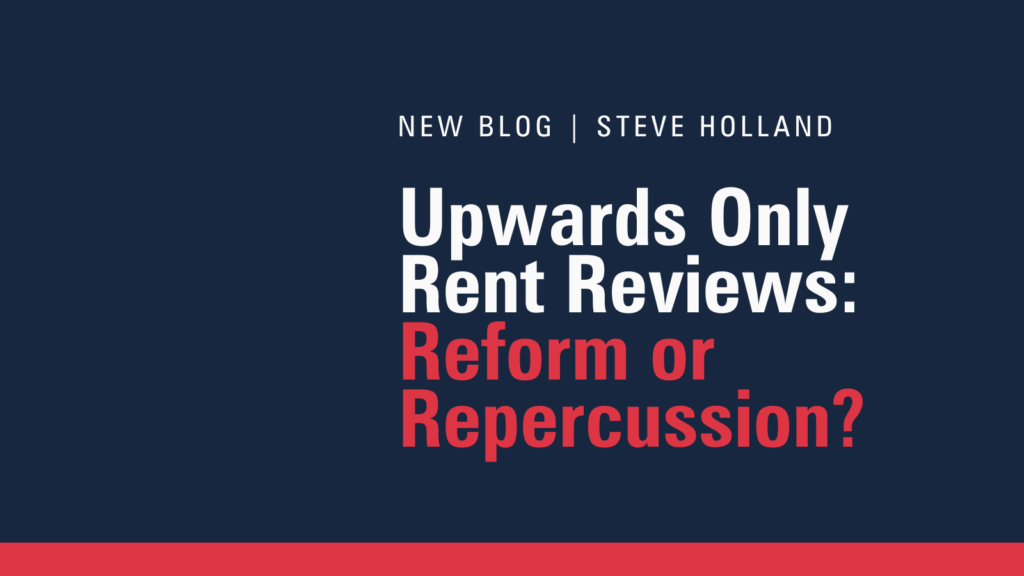The Government took the UK property world by surprise a couple of weeks ago by announcing it intended to ban “upwards only” rent reviews (“UORRs”). It says UORRs “pit landlords against businesses”. Whether that is true or not, it is unclear how this proposal will improve the situation.
What are upward only rent reviews and why do they matter?
For those interested, but not specialist, in commercial property, one of the main cornerstones of the UK commercial market is the ubiquitous use of an “upwards only” mechanism in rent reviews. In effect it is a ratchet, meaning at rent review (typically every 3 or 5 years in leases 6 years or longer) the rent will either stay the same or increase – contractually it cannot go down.
It is extremely important to landlords who will know that, as long as their tenant remains solvent, there is a guaranteed base level of return. That is a key factor in determining the value of a property subject to a lease, via the minimum return (i.e., yield) the investor can expect.
Why tenants might welcome change at first glance
The obvious problem for tenants caused by UORRs is, in a falling market, they are left paying more rent than a property is worth, creating a competitive disadvantage to another business paying the new market rent. On the face of it, it is easy to see why tenants would be keen to see the end to that convention. But I wonder, has this proposal been properly thought through, and if there should be a degree of care as to what one wishes for.
The unintended consequences of banning UORRs
If UORRs are outlawed, property investments (with rent reviews) become riskier. In return I would expect investors to require more rent on day 1, and/or look for pre-agreed fixed increases – which would be allowed but could leave tenants in just the same “over-rented” position. Or alternatively, lessors may prefer a lease without a rent review. At lease end and renewal, the rent is already allowed under statute to go up or down, but there are scenarios where a tenant may not be able to secure a renewal lease at all and could lose the premises. That is not a risk at rent review. Lease renewals are also much more expensive to negotiate than a rent review.
The pandemic shift and the perception of landlords
We saw in the pandemic the surfacing of what I felt was a curious attitude, in government and publicly, namely an expectation that landlords should be the “suspension” in the system because, well, “They can afford it.” When in 2020 the economy was grinding to a halt as we quickly became familiar with the concept of furlough, lots of tenants stopped paying rent, or volunteered themselves a rent reduction or holiday. I did not see the same treatment of most other overheads. The part many ignore is that the provision of real estate is a business in itself. It requires capital, resources, innovation, determination and risk taking – just the same as, say, manufacturing or retailing. It frees up an occupier’s capital to invest in what they do best, and should be a win/win. It puzzled me when it became commercially acceptable to just not pay the rent. It seemed an easy sell that Landlords were the bad guys and Tenants the plucky underdog. The reality is much more complicated and mixed. But is this policy from a similar mould?
Is this another vote-grab?
It is unrealistic to expect a landlord to simply absorb the extra risk of no longer being able to include a UORR and in some cases the cure could be worse than the illness.
This would not be the first time a Government has chased a vote-grabbing headline. But I don’t think many in the property industry were aware it was such a hot topic. And only very recently policies aimed at shifting more mainstream savings and pensions into UK stocks and shares have been promoted. There are plenty of UK PLCs heavily invested in commercial property. Lots of established pension schemes already invest in commercial property. Banning UORRs will introduce a heightened level of risk to that significant sector, traditionally attractive on a global basis as a relatively safe haven. Increasing market risk whilst encouraging more traditional pension savings into equities seems a perilous route to follow.
The Government has also said it believes this rule change will bring an end to empty high streets. I very much doubt it. The change will not be retrospective, so any tenants stuck with over-rented property are not rescued. Moreover, I think the popularity of online shopping, prevalence of working-from-home, tolerance of litter and anti-social behaviour and successive anti-car policies without effective investment in viable alternatives all have much more to do with vacant city centre shops. Energy and resources could be far better targeted.
If you’d like to discuss any of the points raised, please get in touch with Steve Holland, Head of Professional Services, at sholland@innes-england.com


